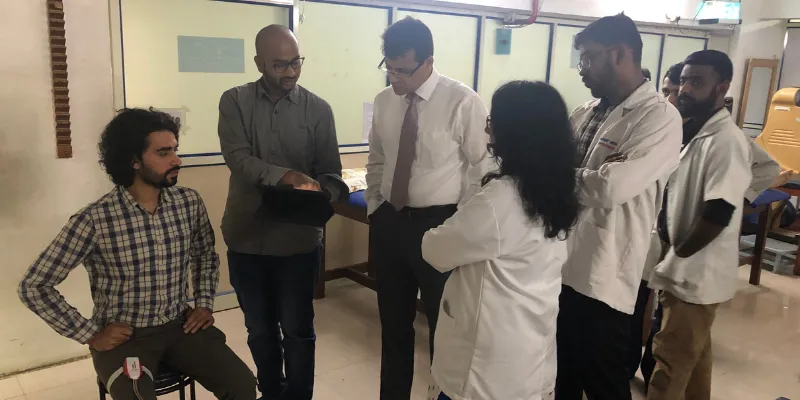This woman entrepreneur’s intelligent wearable will provide end-to-end physiotherapy for chronic knee injuries
Founded by Anmol Ajay Saxena and Sandeep Reddy Golugiri, Ashva Weartech has developed Fitknees Assess, an intelligent diagnostic wearable device that will provide end-to-end physiotherapy for management of chronic knee injuries at your doorstep.
Anmol Ajay Saxena was in the fourth year of her electronics and electrical engineering course at VIT, Vellore, in 2016 when she decided to meet her friend Sandeep Reddy Goluguri over chai. They were planning to brainstorm over their imminent participation in the Cebit-Intel IOT Hackathon in Bengaluru.
She had just finished her evening run, and, out of context, commented that her knees were paining terribly.
“Sandeep asked if I had tried kneecaps or sports shoes for running. He also suggested consulting a physiotherapist for an exercise plan suitable for my body. Having tried all these solutions already, I told him that the only thing that gave me pain relief for a long time was physiotherapy. But since I resided in a girl’s hostel on-campus, I had strict in- time rules and just could not go for physiotherapy sessions consistently,” she recalls.
Physiotherapy for all

Beta testing at a hospital
Something suddenly clicked, she says, and the big idea for their wearable tech Fitknees Assess was born.
“We both realised how important and impactful this idea could possibly be for everyone. If a solution could bring best of the best physiotherapy to the home (or hostel) of patients, every age group could benefit - from babies born with skeletomuscular disorders to young athletes and students; from working adults and military veterans to our elderly grandparents,” she says.
The duo decided to investigate this problem statement further by talking to their family physicians and physiotherapists. On getting their validation and understanding the current situation from a physiotherapist's perspective, they made a basic prototype of Fitknees at the Cebit Hackathon. The duo won first prize and also received support from Intel mentors for further market research and prototyping.
In 2017, Anmol and Sandeep decided to quit their jobs with Ford and Intel respectively to dedicate their full efforts towards Fitknees Assess. They did extensive field research for about six months with leading physiotherapists, orthopaedic surgeons, and knee injury patients.
Anmol says data from their on-field research showed that eight in 10 chronic knee pain patients that were clinically diagnosed with serious injuries like osteoarthritis (wear-and-tear injury of the knee cartilages) never got back for a second physiotherapy appointment. This when physiotherapy is a scientifically proven, natural method for managing chronic skeletomuscular injuries.
“A patient with knee pain is expected to travel to the hospital for multiple physiotherapy sessions. Most patients lack awareness of the risk of injury aggravation if they delay knee pain management. Indian osteoarthritis patients generally come back to the hospital only at very severe stages of the injury. By then, it has already become a surgical case.
"If they opt for home physiotherapy, there is a direct assumption that the quality of treatment is inferior to that provided by highly skilled experts at the hospitals where they got diagnosed,” Anmol says.
Data-driven process

Phase 1 of beta testing
To solve this problem, they developed Fitknees Assess, a sensor-based knee injury monitoring platform that empowers the patient to stick to their physiotherapy treatment through data-driven physiotherapy at their doorstep.
The process works seamlessly. After the first physical consultation in the clinic/hospital, or being discharged from the hospital post knee replacement surgery, the Fitknees Assess tests can be ordered on a weekly basis by the physiotherapist to the home of the patient.
The kit is brought to the location of the patient by the home physiotherapist/ at the nearest physiotherapy clinic.
Fitknees Assess comprises four wireless wearable sensors, strapped on the patient's thighs and shins. Through a series of exercises, data like range of motion, muscle strength, balance, gait, ability to climb stairs, etc. are obtained and given in form of graphical-numerical data analytics reports called the Kneeports.
Physiotherapists can remotely look at the Kneeport to assess the effectiveness of treatment and tweak treatment plans accordingly. They can upload personalised exercise charts through the physiotherapist-facing Cu.Re Physio App. The patients can access exercise charts and also opt for follow-up consultations via video/audio calls or text messages through the Cu.Re Patient App.
As CTO, Sandeep spearheads the technical, manufacturing, and research work. He has deployed all softwares, mobile applications, cloud backend, data sciences, and machine learning algorithms.
Working in tandem with centres
Fitknees Assess has been developed as part of their startup, Ashva Wearable Technologies, which is registered in Hyderabad and now based out of Bengaluru.
The founders provide three options to buyers: pay per month (rental of the equipment), pay per session (commission based), and one-time device sale.
“We understand that due to the COVID-19 pandemic, knee pain patients, especially elderly people, patients are unable to travel for physiotherapy. All knee replacement surgeries scheduled for severe-stage knee patients have been postponed. Physiotherapy centres have taken a financial hit, and we hope to work with them to bring this tech-based solution to the doorstep of patients,” Anmol says.
The co-founder says one of their greatest challenges was finding highly skilled engineers to join their team on full-time basis and work on a shoestring budget and fast-paced environment that their R&D demanded. Fund-raising at the initial, exploratory stages was also a significant challenge. The startup has had to cut down on the burn rate tremendously because of uncertainty in funds amidst the pandemic.
Bootstrapped initially with Rs 1 lakh for conducting field trials and developing the first prototype, Fitnknees Assess has also been supported by DST Nidhi Prayas and Birac Seed Fund through VITTBI, Birac BIG Grant through IKP Knowledge park and Niti Aayog+ Sine IIT Bombay + WEE Foundation Women Entrepreneurship Award. The startup, incubated by Vellore Institute of Technologies - Technology Business Incubator (VITTBI), has raised approximately $126,000 in funding.
Fitkness Assess is currently conducting clinical trials at St John's Hospital, Bangalore. But COVID-19 has also slowed down clinical trials because the number of patients coming for knee pain-related physiotherapy has dropped.
“Our Clinical Study Principal Investigators are Dr Padmanaban Sekaran (CSO Of Ashva Weartech and Chief of Rehab at Sparsh Groups of Hospitals) and Dr Annie Thomas (HOD Of Physiotherapy Dept, St John's Hospital). We have formed a team of four full-time employees and on-boarded a highly revered domain expert, Dr Padmanaban Sekaran, Chief of Rehabilitation at Sparsh Group of Hospitals, Bangalore as our Chief Scientific Officer,” she adds.
Keeping the focus on R&D
Anmol says while there are very few Indian physiotherapy device manufacturers, some startups have been working in the sensor-based assessment and rehab space in India. But Fitkness Assess is the only one to have developed a complete end-to-end solution for chronic knee pain patients.
“We have been controlling our expenditure to ensure ample runway until the next set of funds are disbursed to us. Initially, hardware manufacturing took a big hit because no factories and courier services were working during the lockdown. We had been unable to train our team fully until September 2020, therefore maximum workload had to be borne by my co-founder and me to ensure that R&D kept moving forward,” Anmol says.
Their future plans include commercialising Fitknees Assess in the coming year with physiotherapy centres and home physiotherapy service providers, and improving the quality and features of the product to meet their expectations.
“We will eventually expand the Fitknees Assess platform for sports knee injury-monitoring and rehabilitation in the near future,” Anmol says.
Edited by Teja Lele








